EDIT: See edit below for explanation of why min() and max() are NOT adequate.
=========================
The MS documentation on the functions first() and last() says “Because records are usually returned in no particular order (unless the query includes an ORDER BY clause), the records returned by these functions will be arbitrary.”
Obviously, that makes these functions pretty useless for their intended purpose unless the query includes an ORDER BY. But including that in the query is not a straightforward thing to do because these are "aggregate" functions, so a query that SELECTs on them cannot ORDER BY any other field that is not also submitted to an aggregate function.
I have found that a query based on a single table generally returns results in the order of that table’s primary key. But apparently, that cannot be relied on to always be true and may fail under certain circumstances. There's an excellent discussion of this issue in an article, DFirst/DLast and the Myth of the Sorted Result Set.
That article offers two solutions to this problem:
Option one; you first use the DMin/DMax-Function to retrieve the value from the “sortable” column ... and use this as an additional criterion to your query to retrieve the target record.
Second option; you first create a query just containing the primary key and the max value of the sortable column (e.g. CustomerId and maximum of order date). Then you create a second query on the orders and join the first query in there on these two fields. The results will be all column from the orders table but only for the most recent order of each customer.
Those instructions are pretty complicated, so I'd need to see an example of them implemented in code in order to trust myself to use them myself.
This issue has got to be very common because a lot of businesses need to know the first or last order by a customer that meets some condition. But when I Google "Access query first last "order by"", there are several results that explain the problem, including on StackOverflow, but none that lay out a solution with sample SQL code.
What is the right way to do this, including sample code of doing it?
=========================
Edit:
Many sources online, as well as the comment below by Gustav and the proposed answer by Albert D. Kallal, say you can just use min() and max() instead of first() and last(). Obviously, that's okay if what you want is the value of a field in the record in which that field has the smallest or largest value. That's a trivial problem. What I'm talking about is how to get the value of a field in the record in which some other field has the smallest or largest value.
For example, in the answer by Albert D. Kallal, he wants the first and last tour for each customer, so he can just use min() and max() on the dates of the tours. But what if I want to know the location of the first tour for each customer? Obviously, I can't use min(location). If first() would work in a sensible way and if table [Tours] has the primary key [Date], I should be able to use something like:
(SELECT first(location) from [Tours] where [Customer] = ID_Customer)
I am using code like that and it usually gives me the right answer, but not always. So that is what I need to fix. I understand that I may need to use min() instead of first(). But how do I use min() for this since, as I said, I obviously can't just use min(location)?




